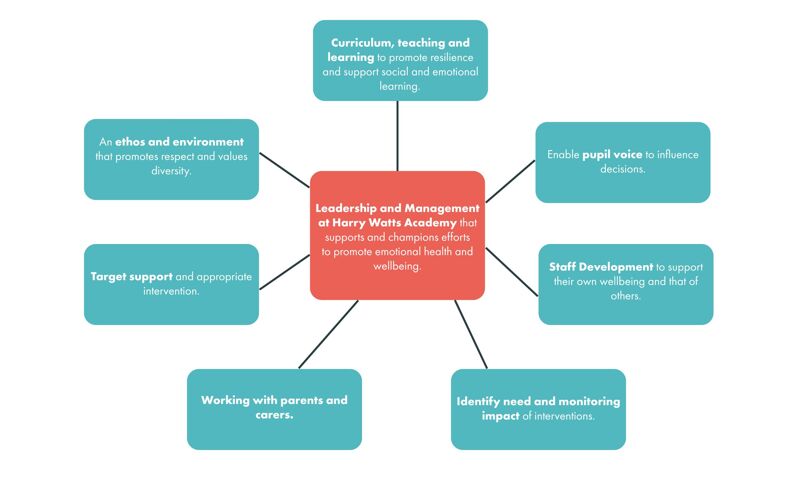Mental Health and Emotional Wellbeing
'Staff know their pupils very well and work ceaselessly to keep pupils on track with their learning. Strong, well understood routines help pupils to self-regulate. When pupils become dysregulated, as an expression of their SEND, staff are skilful in guiding and supporting them back into learning.' - Ofsted
Statement
At Harry Watts Academy it is our vision that all children are entitled to develop to their fullest potential academically socially and emotionally. Emotional and physical health and wellbeing is an integral part of our curriculum.
At our school, we aim to promote positive mental health for every child, parent / carer and staff. We pursue this aim using both universal, whole school approaches and specialised, targeted approaches aimed at identified vulnerable pupils and families.
This policy describes the school’s approach to promoting positive mental health and wellbeing and is intended as guidance for all staff including non-teaching staff and governors. It should be read in conjunction with our safeguarding policy in relation to prompt action and wider concerns of vulnerability.
Ethos
Harry Watts Academy aims to support and teach skills to pupils and staff to increase their awareness of emotional health and wellbeing.
Two key elements to support good mental health are:-
- Feeling Good – experiencing positive emotions like happiness, contentment and enjoyment. Including feelings like curiosity, engagement and safety.
- Functioning Well – how a person is able to function in the world, this includes developing social communication and connections, promoting positive relationships, as well as managing emotions, feeling in control of your life and having a sense of purpose.
To promote first aid for mental health and wellbeing Harry Watts Academy aims to:
- To develop a whole school approach for both pupils and staff
- To create an approach on the 8 key principles identified in ‘Promoting Children and Young people Emotional Health and Wellbeing’ (2015) (see diagram below)
- To work together with families
- To provide a holistic and multi- agency approach that is identified in the children’s individual EHC plans. The following diagram presents eight principles to promote emotional health and wellbeing in schools and colleges

Figure1. Eight principles to promoting a whole school approach to emotional health and wellbeing.
The eight identified principles will underpin the approaches used to support the development and integration of wellbeing strategies within Harry Watts Academy. The policy and curriculum delivery will be tailored to promote the key aspects of improving mental health and wellbeing. It will focus on creating a socially, emotionally and physical rich environment where key relationships can thrive and children can feel secure in their learning. School based programmes which are linked to the curriculum will promote pupil voice through developing independence and choice making decisions. Staff will have access to training and signposting to approaches and resources that will support their own emotional health and wellbeing with an aim to foster teamwork and create solidarity.
Clear identification, impact and outcome measures will feed into school-based programmes and the target interventions that will be offered to pupils. An ethos and environment that promotes respect and values diversity. Target Support and appropriate intervention. Working with parents and carers. Identify need and monitoring impact of interventions. Staff Development to support their own wellbeing and that of others. Enable Pupil Voice to influence decisions. Curriculum, teaching and learning to promote resilience and support social and emotional learning. Leadership & Management at Harry Watts Academy that supports and champions efforts to promote emotional health and wellbeing.
All staff have a responsibility to promote the mental health and emotional wellbeing of pupils, families and their staff teams.
Staff with a specific, relevant responsibility includes:
- Louise Hindmarch - Designated Safeguarding Officer
- Catherine Bhatti, Melanie Howarth, Charlottes Wares – Deputy DSL
- Catherine Bhatti - Wellbeing and Mental Health lead - SLT
- Kaye Wetherall - Staff Mental Health lead
- Brooke Davison - Thrive lead
- Melanie Howarth – Family Liaison Officer
- Emma Ramshaw (Harraton) Emma Baxter (Redhouse) - Mental Health First Aiders
- Martin Thompson - PSHE Lead
- Jade-Louise Riley (Harraton) Stacey Kean (Redhouse) - Better Health at Work Award champions
- Elizabeth Lee (Rehouse) Adele Snell (Harraton) - LSA Mental Health Champions

